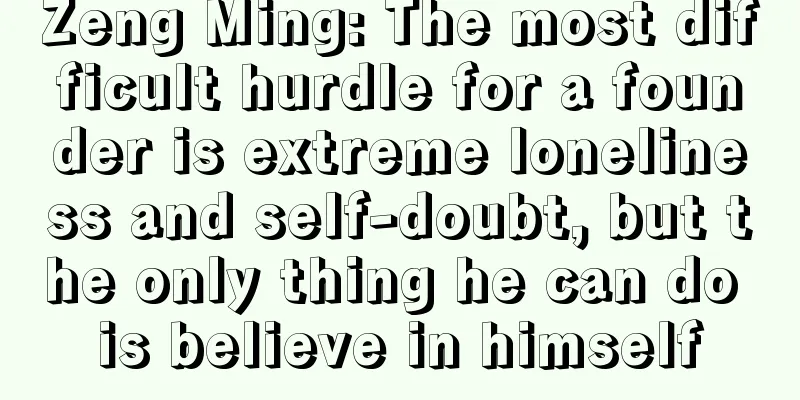Zeng Ming: The most difficult hurdle for a founder is extreme loneliness and self-doubt, but the only thing he can do is believe in himself

Business Thinking Notes: Zeng Ming is the chairman of the Alibaba Group Academic Committee and the director of the Lakeside Entrepreneurship Research Center. Alibaba people like to call him "Professor Zeng". Zeng Ming has met many entrepreneurs and seen them face various challenges. He believes that starting a business from 0 to 0.1 is the most difficult, but greatness is also born from this. 1. From 0 to 0.1 is the most difficult, but it also breeds greatness 1.0-0.1, a level that many companies find difficult to pass I have read the book "From 0 to 1" several times, but I always feel unsatisfied. It does not explain in much detail how to do things, but rather emphasizes the value of innovation. In fact, the most difficult step for innovation is the first step. The next step to step 1 is the expansion process, but the process of platform incubation is very difficult. There are two typical types of mission-driven companies: One is opportunity-oriented. If you know where your customers are and how to enter the market, your business can get going quickly. Getting started is not difficult, but the challenge is how to continue to lead the way and where the long-term sustainable development lies. One is to be able to imagine the future. The biggest difficulty is not finding a point of entry. How to provide value to users at the moment, whether to focus, and where to start are all very difficult questions. The so-called "Internet +" is to transform traditional industries with the Internet, cloud computing, artificial intelligence, etc. "Internet +" is essentially about building platforms and ecosystems, which is different from the past, so the strategy and approach must be different from the past, and therefore the problems encountered in platform-based enterprises are greater. I would like to put forward a concept in particular: 0-0.1, which is a hurdle that many companies find difficult to pass. They need at least two or three years to develop and calm down to face the challenges. Of all the big projects we have seen at Alibaba, such as B2B, Taobao, cloud computing, and today’s Cainiao, I have not seen a team that can find a sense and breakthrough within three years. This is a common problem faced by platform-based companies and is of typical significance. Therefore, in the 0-0.1 stage, the most critical challenge is how to find the entry point scientifically and effectively. The key to 2.0-0.1: How to find the entry point? The most important point of Internet thinking is iterative optimization. If you don’t have an entry point, you don’t even have the opportunity to iterate. You have no way to get feedback (what’s good and what’s bad, so as to make improvements) in an interface for interacting with customers. Even the most basic question , “What value do we provide to what users?” , cannot be answered in the early stages. You may have a vague feeling, but during this period of time, you are not clear about what users to target and what leverage to use. Including Taobao in the early days, we were not clear about whether the core of users was simplicity, cheapness, richness or experience. We often had very heated debates. In the early days, it is critical to go from a vague feeling to having a relatively clear thinking about "who are your first customers and what value do you create". The second is a very important concept. If a platform-based enterprise does not create a platform flavor, you have not taken the first step. It is very important to make the prototype of the platform take shape. To complete a closed loop of business in the most effective way, many enterprises have spread their platforms very widely, but the platforms cannot be encircled and cannot form a synergy. The surface of the platform is built from the line. How to do a good job of the line and how to push the real platform value to your core customers. Another point is how to effectively try and fail. Innovation requires trial and error, which is a necessary cost, but the price is very high. Startups try and try, but they lose money, people disperse, and they lose confidence. 2. Different strategies should be adopted at different stages of the strategy I divide the strategy into four stages: 0-0.1 is the strategic trial period; 0.1-1 is the strategic formation period; 1-10 is the strategic expansion period; 10-N is the efficient execution period. You can see that at each stage, the company's main line, style and focus are different. 1.0-0.1 stage The core is innovation and trial and error. The most important thing at this stage that guides the company forward is vision. The most important thing to focus on is to find the entry point as soon as possible so that the company can survive, otherwise all the work will be in vain. Only the first entry point can bring positive accumulation to the company, and the most dependent person in the first stage is of course the founder. At this time, the leverage of capital will not play a big role. Many companies are in trouble because the prototype has not come out. At this time, having too much money will only make things worse, because you can try it out generously but not get more effective feedback. Phase 2.0.1-1 In the second stage, a new ability is needed, which is the ability of structured thinking. It is necessary to aggregate the directions and highlights seen in the first stage, avoid confusion, and lead the team to reach consensus, so that consensus can become a guiding tool for the company's progress. At this time, we need to find the detonation point and develop rapidly on a large scale. The detonation point is very important. 3.1-10 Stages After the explosion, we have to enter the third stage. It is not enough to rely on the team alone. We have to rely on the organization. The organization and the formed strategy must match. The strategy cannot be a vague idea or team understanding, but it must be able to be communicated, decomposed, and understood by most basic employees. The strategy must be clear enough to be turned into a business model. In the business model, we must understand what value we create and how we make money. The third stage is to find the levers of development, such as the lever of capital. Next, let’s break it down using cases. The first one is the Taobao case, because everyone is familiar with it and it has gone far enough, so I would like to share it. We have reviewed this with many colleagues at Taobao several times, and this time we have a new understanding from a new perspective. At the 0-0.1 stage, I think the symbol of passing this hurdle is that GMV exceeds 100 million. At that time, Jack Ma forced Sun Tongyu to exceed 100 million. Jack Ma didn't know why he had to exceed 100 million, but he felt that a chemical reaction would occur in the vagueness. In 2006, there was a lot of pressure, which forced innovation; in 2007, Taobao's daily GMV exceeded 100 million, and the annual GMV was 43.3 billion. This was the 0-0.1 stage. By 2008, Taobao's annual revenue was 100 billion yuan, and Taobao was only ranked fourth, ahead of Gome, Suning, etc., but none of these companies exceeded 105 billion yuan, and hovered around 100 billion yuan. By 2014, it had exceeded 1 trillion. This was a period of explosion and expansion. The fact that it could run so fast was related to the solid core of 0-0.1. I regard daily income exceeding 100 million as a milestone in the 0.1-1 stage, because daily income exceeding 100 million is based on the fact that each role on the platform makes money, and the platform can make money. We have introduced a precise advertising and marketing system. The whole system automatically completes the interests of each role on Taobao through the Internet, rather than relying on manual work. Through algorithms and intelligent engines, a large number of players are connected to each other. What has brought huge impetus to the overall situation is that hundreds of thousands or even millions of Taobao customers and sellers are connected. Taobao sellers can provide product links, and small advertisers can put these links on their own small websites. As long as someone clicks on and buys from their website, the small website can share the profits. This is an automated network system that does not require Taobao to have a large manpower base. This is the value of intelligent algorithms. Otherwise, no matter how much manpower is invested, it will not be possible to do this. This new era mechanism has laid the foundation for Taobao's profit distribution mechanism, which is a very important key point in the second stage. The core strategy of the second stage is this advertising system. The core of the first phase of the strategy is the community. In the early days, the relationship between sellers and buyers could not be clearly divided. Many good sellers were good buyers themselves, and good buyers themselves evolved into good sellers. Good sellers found good opportunities and naturally developed into sellers. The role definition of new species in the early days was very vague, but it gave them the possibility of automatic development and evolution, which was a major feature of Taobao in the early days. In the second stage, search and advertising became the driving force of Taobao. When we tried to implant a revenue model, many Taobao waiters would blush and think that Taobao should not talk about money. This was because Taobao’s very strong mission-driven approach in its early days was “to make it easy to do business anywhere in the world.” The chivalrous martial arts culture and waiter culture laid the foundation for Taobao’s very important core. In the meantime, a very important tactical cornerstone is Wangwang, which was also inspired by QQ. Although it was originally intended to compete with QQ, the value of this tool is that it allows sellers and buyers to interact directly, thereby generating a very rich Taobao market culture. This is an important means for Taobao to drive eBay out of China. eBay prohibits sellers from contacting buyers, so that transactions can remain on the platform and eBay can charge fees. Taobao allows buyers and sellers to develop feelings in the process of direct contact, which also brings brand recognition and the Taobao spirit of "intimate". Without this kind of cultural influence, Taobao would not have been able to achieve such an ecosystem. Looking back, I think an important point in Taobao's culture is that it is very open. I asked the early people if they had a hard time, and they said they had a lot of fun. If a person is too tight and too strict, there is no possibility of innovation. Only by letting go can great innovation be achieved. The second stage is wild growth, bottom-up and self-driven. Employees start a project when they see something, and everyone tries to see opportunities from different perspectives. In the third stage, wild growth alone is no longer enough, and the power of the organization must be mobilized. The challenge of combining a clear strategy with bottom-up innovation is enormous. At this time, the open platform played a very critical role. Various software service providers, operating agents, and other roles emerged. Taobao moved from a trading market to an e-commerce circle ecosystem. Later, the entire Alibaba focused on the most basic facilities and left the various innovations above to external partners. Unfortunately, none of us have enjoyed the benefits of efficient execution. Taobao is also facing this challenge. Everyone is also thinking about new models. Jack Ma is also proposing the concept of "new retail new model". How can we continue to optimize this model? The only way is to change the engine and continuously upgrade and replace it. Every founder has to imagine what stage they are in. 3. 4 tips to increase the probability of entrepreneurial success Based on Alibaba's experience and communication with entrepreneurs, I have summarized four key points for entrepreneurs: high aspirations and low skills, trial and error must be based on vision (vision and direction), carnival on the edge of the cliff, and self-cultivation (confidence and self-doubt). Experience 1: Don't pursue clear strategies and business models in the early stage of high aspirations and low skills . Everything is in chaos at the beginning, it is impossible to have a clear strategy, let alone a complex and complete business model. Don't expect to achieve everything in one step. You must take advantage of the weak, land on the ground, don't idle, and do the real thing. The most difficult thing is to have high aspirations but low skills. You need to be androgynous, have the ability to think in a macro sense, maintain your imagination for the future, maintain a big picture, but you must also be down-to-earth and start from a very small point. When I first arrived at Alibaba and communicated with Jack Ma, he told me every day that "if you stick a bayonet in, it will bleed." If you stick a knife in a board, you may not be able to break it even after several times. So, it is useless to just talk big, and you can't just draw big pictures. If you are too good at talking, this is what often happens when a few elites get together. After two years, you finally find that what you have done is not what you want to do. Of course, if you are too biased towards execution, after two years, you will find that someone has run ahead of you, and you will have no chance. These are two very common things. Specifically, in the 0-0.1 stage, don't pursue cleanliness, beauty and clarity. At this stage, the strategy is not clear, not to mention the business model and revenue model. This is a gradual process. You should start with the soft persimmons on the edge. After you have squeezed more, you will naturally be able to squeeze harder ones. If you start with hard bones, you will generally become a martyr because you have become a model for others. This is a very important point. Don’t be afraid of small things at the beginning. Be brave to start with small things. But after you start, you must know that there is a possibility of enlarging them, rather than still being small after cutting in. I would like to add that when people are raising funds, they often hear a sentence, "You need to explain your product clearly to the VC in the elevator in two minutes." This is nonsense. But in your A round, you should try your best to explain the core value of your customers. You may not be able to explain it clearly, but you must force yourself to think clearly. When thinking, you might as well think bigger and farther, and when doing, you might as well think smaller and more accurately. Only then will you have a chance to conquer the first hill and the next one. Lesson 2: Trial and error must be based on vision This stage must not be a blind trial and error. Most people who follow the trend are blindly hitting the target, without any accumulation, and feel wronged when they die. The trial and error at this stage is to continuously test and adjust the future assumptions (Vision) through practice, until the "mapping point" of the future is found today, and from this point, it is most likely to evolve into the future. This is a process of focusing. You must have a vision as a premise for trial and error, otherwise your attempts will be in vain. Only by testing based on a certain foundation can you have an iterative route and direction. Without this as a premise, it is like a blind man touching an elephant, and in the end you will not be able to figure out a complete picture. It would be unfair to die, and you have indeed done a lot of useless work. Trial and error is to find the mapping point of the future in today, and this point can lead you to the future. To use a professional term, it is disciplined and purposeful trial and error, knowing the results and goals. This is the relationship from Vision to Action. On the one hand, you need to act quickly, but there is a very clear Vision behind it. In this process, a very important point is: How to have a Vision? In fact, the act of looking for Vision itself can bring you Vision. If you look at the future every day, you will be better than others. This is not something that anyone is born with, but a process. Experience 3: Carnival by the Cliff When discussing with an entrepreneur, he kept repeating: "We only have three months." I suddenly found out where the problem was. If a company uses a three-month or three-week cycle, it will not be able to test out anything decent, which will cause anxiety for the company as a whole. Startups need a sense of urgency, but it cannot permeate every aspect of the organization, otherwise there will be no room for innovation. The CEO has to bear this pressure even if he has no other options, and he has to keep talking and laughing even if he has no money. There was a time when Alibaba only had 10 months of cash flow, and it was only in the last two or three months that it saw an increase in cash flow. So, how did you get through in the end? In fact, it is a question of belief or not. Alibaba later had a local saying called "believe in the power of belief". It is not enough to have just one level of belief, you need more belief to keep moving forward. In 2012, Taobao started discussing the third phase of strategic upgrades. The meeting was very tense and the debate was very intense. At the end, I said something that shocked everyone. I said, "Vision is for challenge, not for proof." Vision needs to be believed. Only those who believe in it will do it, and only after doing it can it be proved to be right. If you don't believe in it, Vision will not succeed. In the early days of the company, whether you are looking for employees or partners, you will find that those who can unite with you are all proletarians, people who have nothing. Because they have nothing, they want to fight together. When Taobao was talking to Metersbonwe in the early days, Jack Ma also came out. It took at least four years for the other party to think that they could try opening a store on Taobao. They didn’t believe it at all in the early days. In the early days, you couldn’t borrow anyone’s help. In the early days of the ecosystem, people with no accumulation came together because they believed in a common vision. If you don’t have passion, you won’t go far. If you don’t have a passionate team, you won’t be able to overcome so many obstacles. If you don’t have fun doing this, you won’t be able to do it. Alibaba Cloud started in 2009. The vision is very clear. People who come here all believe in it. But every year, a group of people leave, and then another group of people come in. If you don’t have this feeling of enjoyment, you won’t be able to stick with it for long. Experience 4: Confidence and self-doubt Founders are often in this state. Sometimes they feel they are right, and sometimes they feel they are all wrong. What if they lead the company into a pit? When should they be arbitrary? Persist or give up? There is definitely an element of luck involved, but this itself is a process of self-cultivation. The most difficult hurdle is this one: extreme loneliness, extreme self-doubt, but you can only believe in yourself. How to overcome? How to improve mental strength? How to maintain self-confidence under moderate self-doubt? In the past two years, the development of the Internet has been increasingly integrated with tradition. Some people have strong industry experience, some have strong Internet experience, some understand platform thinking but not business, and some understand business but not platform thinking. In this process, how to stick to your own advantages, when to listen, and how to combine these things into the wisdom of the team, this is a great test of everyone's efforts, but you must also maintain a game mentality to go through this process. In 2002, the board of directors talked to Jack Ma about looking for a CEO for many years, but none of them were found. Many times when you want to find a good CEO, you still have to start from among the people you trust. 4. From 0 to 0.1, four core decisions First, the core customer value is strong, distinct, and easy to perceive. This is a very important point for a platform to get off the ground; you may have a good concept for a platform, but the bottom line is whether your customer value is clear enough. No matter how good your ideal is, people will not use your services just because you are a platform. Why is it difficult to get started on a platform? Because you need to integrate a service using the platform's principles and strategies, and customers can be satisfied with it, and then you can find the first batch of users. Platforms often look for very small entry points at the beginning, and the customers you find are those who were originally on the margins of society. Because the services and solutions provided to them in society were very poor, although yours are not very good either, but the value has increased by 5 or 6 times, they will come to use you. As long as someone uses you, you have the opportunity to evolve. The earliest users of Facebook were a group of bored boys from Harvard who looked at girls' photos. It is precisely because of such a clear user training process that the model and network can begin to iterate and optimize. If you don't think clearly about the value you create, everything is empty talk. Second, how high is the entry threshold? The service areas are different, the goals are different, and the entry barriers are different. Taobao has chosen a field with zero barriers and anyone can enter, but platform governance is very difficult because it can only be governed after the fact. The difficulty in making a direction decision is that you can choose anything, and each direction has advantages and disadvantages. Third, how to solve the credit problem? The value of a platform lies in the symmetry and efficiency of information circulation, and secondly, credit. Without credit, there is no platform. Another milestone in the early development of Taobao was Alipay. Based on Alipay, a credit system was formed. Establishing a credit system in a society lacking credit brought the most basic things for ecological development. As long as you build a platform, you have to answer who will provide credit. Is it the sellers themselves who say it, or do you label everyone's credit? If it is the latter, how do you solve the problems of scale and difficulty in satisfying everyone; if it is the former, is the information provided by the sellers themselves credible, and how do buyers authenticate the sellers' credit? Is the initial cost of transactions in this way too high? If buyers are asked to evaluate, how to avoid malicious behavior or personal preferences of buyers? How to screen out the common behaviors of buyers for sellers? These are all a series of very complex platform governance issues. Fourth, how to meet the basic functions? ——Preliminary division of roles The most taboo thing for a platform in its early stage is to be too broad and too thin. What is the most critical function to make the platform run? The definition of this function is very important. A platform-based enterprise cannot succeed without a vision. Vision-based actions are more important than static visions. When you want to build a large enough enterprise or ecosystem, you need to have a large enough vision to support it. The Internet is constantly changing, and business is constantly changing. Every 3 to 5 years, we think intensively about the future and whether the business is big enough from the perspective of Vision. And several of us are constantly working on it to clarify whether this Vision should be pursued. *The article is the author's independent opinion and does not represent the position of Noteman. |
<<: Soy sauce latte, that’s it?
>>: Dong Yuhui’s most amazing product promotion copywriting is all the rage on the Internet!
Recommend
"2025 will definitely be a more difficult year for cross-border expansion"
In 2024, the cross-border e-commerce industry has ...
When a large number of North Americans flock to Xiaohongshu...
As TikTok faces the risk of being banned in the Un...
Just now! The official account can modify pictures!
Public account articles can now modify images, whi...
Event planning results are poor? It’s time to change your thinking!
Students who work in planning know that online act...
Which site does Shopee do cross-border business? Which ones are easier to do?
When you choose to do cross-border e-commerce on S...
With revenue of 10 billion yuan, private domain turnover will account for more than 20%. How does Anta plan its private domain?
As the cost of public domain traffic continues to ...
Comments on 14 popular money-making projects
Faced with the numerous money-making projects shar...
Three steps to achieve your goal: goal setting, path design, and capability planning
How to set goals in the workplace and plan a reaso...
Operational upgrade: from P4 to P5
Editor's note: If P4 in operations is defined ...
Everyone loves Anthropic
Anthropic, an emerging AI research company, is gra...
Can individual business owners open Amazon stores? How to operate Amazon?
No matter which platform you open a store on, you ...
You have to be able to do the math when you run a private domain
To run a private domain, you need to know how to c...
How long is the payment cycle for Amazon? How is the payment calculated?
As one of the world's largest e-commerce platf...
Jiugongge live broadcast makes people rich: "Big Brother" spends tens of millions on rewards, and the anchor earns 200,000 yuan a month
Jiugongge Live has recently launched a low thresho...
Xiaomi's chief copywriter.
As a diversified technology brand, Xiaomi's br...









